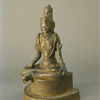Being ‘European’ in Colonial Indonesia. Collectors and Collections between Yogyakarta, Berlin, Dresden and Vienna in the Late Nineteenth Century
DOI:
https://doi.org/10.18352/bmgn-lchr.10739Abstract
In this article, I use the trajectories and meanings of objects in the collections of two Eurasian men, George Lodewijk (‘Louis’) Weijnschenk (1847-1919) and Jacob Anthonie Dieduksman (1832-1901), to illustrate how juridically registered ‘Europeans’ in the Dutch colony of Indonesia used objects to negotiate their identities, their ‘Europeanness’ and hence their social status in the late nineteenth century. In response to the general increased demand to be socially and culturally European in colonial Indonesia, these men took advantage of both the growing enthusiasm among museums throughout Europe to obtain ethnographic artifacts, and of the European practice of collecting as a bourgeois pastime, to demonstrate their ‘Europeanness’. By collecting and donating objects to European museums, they were able to widen their social networks, gain economic capital and perform their belonging to Europe, their unique knowledge and their cultural enterprises. These two micro-histories show the interconnectedness of countries, people and identities across European empires in both Asia and Europe in which demands and opportunities interacted, and reveal how colonial knowledge, violence, hierarchies and indigenous agency were an integral part of European history, culture and museum collections.
In dit artikel volg ik de reizen en betekenissen van objecten uit de collecties van de Euraziatische George Lodewijk (‘Louis’) Weijnschenk (1847-1919) en Jacob Anthonie Dieduksman (1832-1901). Het artikel maakt duidelijk hoe deze ‘Europeanen’ in juridische zin in laat negentiende-eeuws koloniaal Indonesië objecten konden gebruiken om hun identiteit vorm te geven, hun ‘Europees-zijn’ aan te tonen en daarmee hun sociale status te vergroten. Als reactie op de toenemende behoefte in de kolonie om een sociale en culturele ‘Europese’ identiteit kenbaar te maken, maakten deze twee mannen gebruik van de groeiende vraag van Europese musea naar etnografische objecten, en van de burgerlijke praktijk om objecten te verzamelen, om zo hun ‘Europeesheid’ aan te tonen. De twee case studies tonen aan hoezeer verschillende kolonies, landen, mensen en identiteiten in een dynamisch spel van vraag en aanbod nauw met elkaar verbonden waren en hoe koloniale kennis, geweld, hiërarchieën en lokale agency integraal onderdeel waren van de Europese geschiedenis, cultuur en museumcollecties.
This article is part of the special issue ‘The Dutch Empire and Europe. Demands and Opportunities’.
Dit artikel maakt deel uit van het themanummer ‘The Dutch Empire and Europe. Demands and Opportunities’.
Downloads

Published
Issue
Section
License
Authors who publish with this journal agree to the following terms:
a) Authors retain copyright and grant the journal right of first publication with the work simultaneously licensed under a Creative Commons Attribution 4.0 International (CC BY 4.0) that allows others to share the work with an acknowledgement of the work's authorship and initial publication in this journal.
b) Authors are able to enter into separate, additional contractual arrangements for the non-exclusive distribution of the journal's published version of the work (e.g., post it to an institutional repository or publish it in a book), with an acknowledgement of its initial publication in this journal.
c) Authors are permitted to post their work online (e.g., in institutional repositories or on their website) prior to and during the submission process.
Authors are explicitly encouraged to deposit their published article in their institutional repository.











